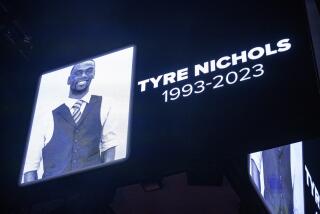Judge Orders Jury to Keep Deliberating in Oakland Police Trial
- Share via
OAKLAND — For the third time, jurors in the Riders police abuse case told the judge Thursday that they were hopelessly deadlocked. And for the third time, a somber Alameda Superior Court Judge Leo Dorado ordered them to continue their deliberations.
Looking drained and dejected, the mostly middle-aged jurors had hoped that after 3 1/2 months of deliberation the judge would excuse them.
The trial of three former Oakland police officers, who called themselves the Riders, began one year ago.
The former officers, all of whom have been fired and who pleaded not guilty, are charged with 35 felonies, including kidnapping, falsifying arrest reports and assault.
The charges stem from a series of allegedly illegal arrests the officers made over 10 days in the summer of 2000 in the tough northwest part of the city.
The alleged ringleader of the group, Frank “Choker” Vazquez, 46, fled the country and is being sought by the FBI and Oakland police.
The jury, which was given 122 pages of instructions and 76 pages of verdict forms, heard testimony at trial from 84 witnesses and reviewed 350 exhibits entered into evidence.
In the last 10 days, jurors took eight votes but still had agreed on only eight of the 35 criminal counts. As they read the votes in the flag-draped courtroom, the numbers reflected the deep division: 7 to 5, 7 to 5, 10 to 2, 10 to 2, 8 to 4, 6 to 6
The jury foreman advised the court: “We are convinced that additional requirements to continue to deliberate will yield no new verdicts.”
But swayed by a few changed votes in the last 10 days -- only the jury knows in which direction -- the judge admonished them to continue.
Before making his decision, the defense attorneys pleaded with the court to let the jurors go.
They said this may be the longest criminal trial deliberation in California history. “Holding this jury,” said defense attorney William Rapaport “is holding them hostage.”
His colleague, Mike Rains, went further: “I believe this jury is on the verge of being mutinous.”
Defense attorney Ed Fishman pointed out that the word “verdict” comes from the root word “truth.” “If we send the jury back,” he said before the judge had made his decision, “we run the risk of losing sight of the truth.”
He said he worried that the jurors will render a vote just “to go home rather than to tell the truth.”
The judge was unmoved.
The former officers, Matthew Hornung, 31, Clarence Mabanag, 37, and Jude Siapno, 34, sat erect in dark suits in the courtroom, rarely glancing at the exhausted, shirt-sleeved jurors. If found guilty of the charges, the former officers could face lengthy prison terms.
The four came under suspicion after a rookie officer, Keith Batt, alerted officials to the officers’ conduct. Batt, now a police officer in a nearby suburban agency, has not commented.
In his instructions to the jury Thursday, the judge advised the panel to try different tactics. He suggested that different jurors lead the discussion anew and that they role-play, taking positions that they oppose.
Worried about angering the jurors, defense attorneys earlier in the proceedings had asked the judge to tell them that the defense had not requested they continue their deliberations. The judge refused. Dist. Atty. Tom Orloff, however, urged the judge to return the jury to their deliberations.
More to Read
Sign up for Essential California
The most important California stories and recommendations in your inbox every morning.
You may occasionally receive promotional content from the Los Angeles Times.













